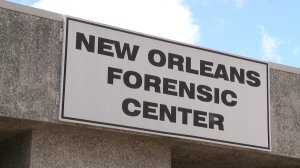 NEW ORLEANS (WGNO) – The New Orleans coroner says he has spent his first year in office striving to perfect a “culture of accountability”. He has resolved outstanding death certificates and tried to give families answers faster. But those are just two items off the top of Dr. Jeffrey Rouse’s priority list. He says he used the lion’s share of a 23% budget increase, to boost his investigation team from one full-time employee and one part-time to five full-time death investigators.
NEW ORLEANS (WGNO) – The New Orleans coroner says he has spent his first year in office striving to perfect a “culture of accountability”. He has resolved outstanding death certificates and tried to give families answers faster. But those are just two items off the top of Dr. Jeffrey Rouse’s priority list. He says he used the lion’s share of a 23% budget increase, to boost his investigation team from one full-time employee and one part-time to five full-time death investigators.
“One of the chief tasks of a death investigator is to gather information that the pathologist asks for after the autopsy. That could be witness statements, it could be getting police reports, it could be going back to the scene of the death to ask additional questions. Those are all activities that are difficult to do if you’re the only death investigator and you’ve got a new death to handle,” Rouse explains.
New Protocol
As the City of Baltimore recovers from the violence that erupted after a 25-year-old man died while in police custody, another major accomplishment for Rouse’s first year is the establishment of a protocol in the case of deaths associated with police activity.
“In those cases it’s exceptionally important that the diagnoses that come out of the coroner’s office are believed,” Rouse said.
From now on, whenever a death happens at the hands of New Orleans police or while someone is under police custody, a new protocol is activated.
“I have to make that scene, my chief investigator has to make that scene, in addition to the investigator that is on call. And the autopsy does not happen rapidly,” Rouse explains.
He said before the autopsy even begins, his office will reach out to the family directly to see if they want to be represented by a lawyer of have an independent doctor come watch.
Goals
Dr. Rouse says his goals for the future include expanding the mental health side of his job and doing what it takes to get national accreditation.
He has also brought his office up to speed with the 21st-century ditching old-fashioned paper files with a computer-based system.


















